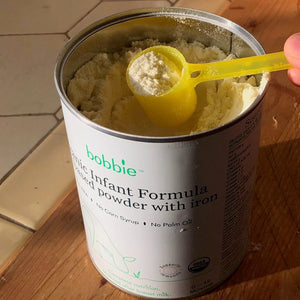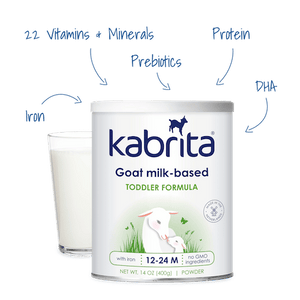Below is an email I recently sent to a private client of mine. Since the number one question I receive is “What is the safest infant formula?,” I thought some of you might be interested in my analysis of the two safest brands of baby formula, HiPP vs. Holle (both from Europe). Note that whichever formula you choose, you should always use a water filter to remove chlorine (carcinogenic) and fluoride (linked with lowered IQ). (Here’s more on why you should get a filter and which ones I like.)
Dear E.:
So the bottom line is I would recommend Holle formula as the best option, but it’s not without some problems, unfortunately (yet again it becomes clear that nothing can compare with breastmilk). HiPP is superior in a few ways, but I’ll explain why ultimately I would go with Holle below.


Here’s what I considered when researching HiPP vs. Holle:
- Palm oil. Palm oil is an ingredient that a lot of people worry about (suspected to affect bone density), and both HiPP and Holle contain it. However, because they each contain a blend of other oils (like coconut and sunflower), I don’t think the amount is as concerning. They do both also contain rapeseed oil, otherwise known as canola oil, which is also somewhat controversial. It’s worth noting that Baby’s Only doesn’t contain palm oil–but it does contain soybean oil, which I don’t like, so not really a huge win.
- Aluminum issue. The HiPP ready-made formula is preferable to the HiPP powder because the latter has strangely high aluminum levels, although even the ready-man has borderline levels. (I can’t figure out why–possibly because it comes in aluminum pouches (within a cardboard box)). However, in general I actually DON’T like ready-made formulas because they contain soy lecithin (sometimes extracted with hexane…and soy is problematic anyway because of its estrogenic properties). On the other hand, the amount of lecithin is relatively small, and probably worth the trade-off. Note that the HiPP Growing Up milk in powder form actually has much lower levels of aluminum (but you can’t use that until after 12 months, and it does contain soy lecithin. Sigh). Bottom line here is go for ready-made or Growing Up milk if you do get HiPP, but with Holle you don’t have to worry about this.
- LCP oils. The addition of omega 3 and 6 oils in U.S. formulas is controversial because of the extraction methods (super complicated issue so I’ll spare you all the details). HiPP has these added oils, but I suspect the extraction methods are probably required to be cleaner in Europe. Unfortunately, I’ve been unable to get to the bottom of this, so it’s a question mark and potentially another negative for HiPP. And studies show that the addition of the oils doesn’t improve the nutrition for babies anyway, so their absence isn’t really a negative for Holle.
- Organic practices. Both of these companies have been around for more than 50 years, and the dairy products from both come from grass-fed, organic cattle, certainly of a higher quality that anything you get here. Holle farms are certified organic and biodynamic–which I’ll simplify by saying is like organic-plus, with very strict standards from the processing all the way to the packaging. Another point in the Holle column.
- Sugars. All formula has a lot of sugar (breastmilk is naturally quite sweet), and HiPP wins in this category, as it uses lactose as a sweetener, which is the best option (and also the most expensive). Holle uses maltodextrin (a plant-based sweetener), although it seems to use less of it than most American formula brands. And here’s an update from July 2015: Lebenswert is a newish formula under the Holle umbrella. The Stage 1 Lebenswert formula contains lactose instead of maltodextrin, and Lebenswert is now available at here!
- Prebiotics. This is another win for HiPP. Holle doesn’t contain these, and it’s one of the big things found in breastmilk but missing from formula.
Bottom line: Both HiPP and Holle are superior to American formulas, in my opinion. They lack many of the concerning ingredients found in most formula you get here, don’t have white sugar or corn syrup in them, and also skip some preservatives and the carrageenan found even in other organic formulas. If it were my baby, I would probably choose Holle because of the aluminum issues with HiPP–which to me is more concerning than the maltodextrin (the only major downside to Holle). The lecithin, biodynamic farming, and LCP oil issues further put Holle in the lead. And if you choose Stage 1 Lebenswert, you skip the maltodextrin as well.
Stay sane,






200 comments
Maia James
Hi Tabatha-
No, I’m sorry but I am not familiar with that one!
Tabatha
Have you done any research on purely loved organics? Just wondering if it is legit.
Lili
Ginger.
When i told my doctor about Giving my Baby Holle FOrmula he had no clue . My doc just gave me the stink eye. At the end of the day its your baby and you know best. My little one just turned 9 months, hasnt gotten sick once and is super healthy. I dont know if its because of the formula or not but i would like to think so since its costing me a pretty penny to get her the best .
Elaine
I am wondering what the iron pyrophosphate and copper sulfate are in the Holle Lebenswert stage 2 formula and if this is safe for my baby.
Imola
About the DHA in Hipp I found this source:
Since 2010, LCP’s (AA & DHA) and prebiotic oligossacharides (GOS) have been added to our formula range, so that bottle-fed babies can benefit. These are key ingredients which are also found in breastmilk. It is the addition of these compounds which means that HiPP milks are no longer vegetarian The LCP’s which are added to our infant and hungry baby powdered formulas are from a fish source, although the ready-to-feed versions contain an algae source. The prebiotics which are included in the ready-to-feeds and the follow-on-milks are made from lactose, and the extraction method used to separate this lactose from the milk involves animal rennet. Similarly, the lactose and whey powder used in our Growing up milk (both powder and ready to feed) and Good night milks use the same extraction method. Unfortunately, sources of non-animal rennet are scarce, and this is an industry-wide problem. As a result, most of the standard first infant formula milks currently available in the UK are not vegetarian. We believe strongly in the benefits of having prebiotics and LCPs in our formulas to help soften stools and aid digestion for babies so we believe the inclusion, and decisions made as a result, are the right ones in order to provide babies with ‘the next breast thing’.